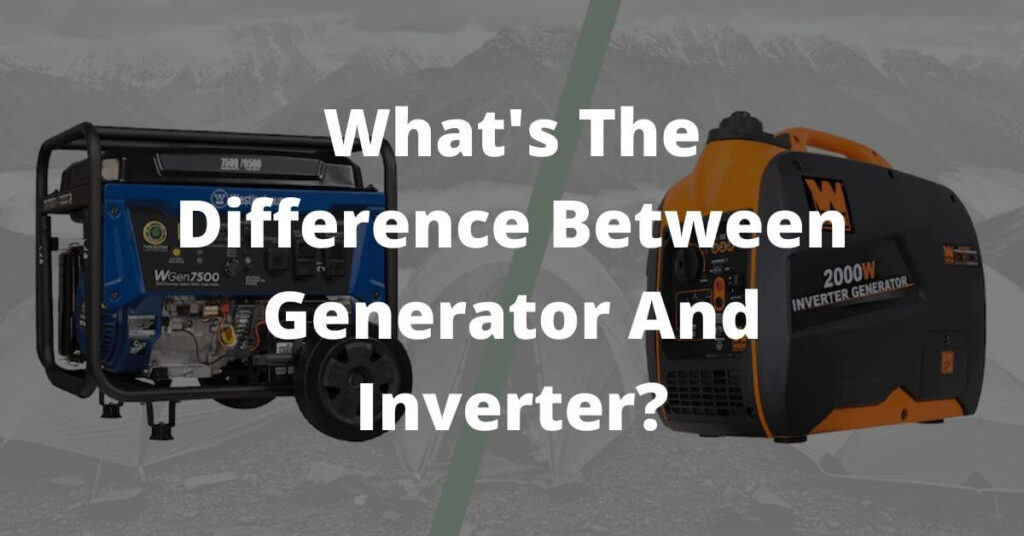It’s not uncommon for consumers to be confused about the difference between a generator and an inverter, as they both serve similar purposes. However, it’s crucial to understand the fundamental distinctions between the two.
A generator generates electricity from external sources such as gasoline, diesel or natural gas, while an inverter is designed to convert DC power into AC power. This is important because most household appliances and electronic devices require AC power to function.

An inverter can provide this power instead of a generator, which relies on mechanical means to produce electricity. To gain a more comprehensive understanding of the differences between generators and inverters, you may want to read more about them in an informative article.
What is a Generator?
Generators are mechanical equipment that convert energy from external sources, such as gasoline, diesel or natural gas, into electrical energy. Unlike an inverter, generators don’t change DC power into AC power. Instead, they rely on the principle of electromagnetic induction to produce electricity.
The speed at which a generator runs is crucial to its ability to produce electricity, and it is powered by various mechanical sources such as diesel engines, steam turbines, water turbines, and motors.
Generators are often used in emergency situations when there is a power outage, and they have many industrial applications such as powering power plants, mobile equipment, communication systems and electroplating, as they generate direct current (DC) power.
What is an Inverter?
Inverters are electronic devices that convert direct current (DC) into alternating current (AC) power, which is used by most household appliances.
They work by incorporating additional electronic circuits that manage load and battery charging, making them perfect adapters that allow conventional home wiring to power low-power appliances that are powered by batteries. Unlike generators, inverters do not produce electricity, but rather change its form to match the standard that household appliances use.
For the best outcome, the power produced by inverters must be of the same quality as the electricity produced by main electricity grids.
The inverters can operate independently or connect to the main grid, and they can power a wide range of appliances such as refrigerators, microwaves, water purifiers, and other low-power devices. It is important to note that all household appliances use AC power, making inverters crucial for converting DC power to match that standard.
8 Main Differences Between Generator and Inverter
Let’s clear up any confusion by knowing the difference
1. Current
When comparing inverter generators to traditional generators, the most significant difference is the type of electricity they produce. Conventional generators generate alternating current (AC) power, while inverter generators generate electricity through a three-stage process, converting it from AC to DC and back to AC again.
This unique feature of inverter generators makes them a highly efficient and versatile power source.
Inverter generators are known for producing stable sine waves, which makes them a “clean energy source.”
This means that harmonic distortion is minimal, making them an ideal power source for sensitive devices like smartphones, tablets, and laptops.
The output of traditional portable generators, on the other hand, is characterized by chaotic sine waves, resulting in a much higher level of harmonic distortion.
While the current produced by a traditional generator can still be used for many electrical appliances, it is not suitable for devices with microprocessors.
This makes inverter generators a more suitable option for powering modern electronics and appliances that rely on microprocessors, such as gaming systems, smart home devices, and high-end audio equipment.
2. Power and Fuel Efficiency
When it comes to producing power, conventional portable generators have an edge over inverter generators. This is due to several factors, including the difference in fuel tank size and the way electricity is generated. Conventional generators produce AC current in a traditional way, while inverter generators use a more advanced method which is more energy-efficient. They automatically adjust their engines to match the load, which allows them to produce the exact amount of power needed, and this capability is not available in traditional portable generators.
Inverter generators are also more fuel-efficient, which allows them to use less fuel for similar run times. This also makes them more portable as they have smaller fuel tanks. On the other hand, conventional generators have larger fuel tanks which can hold more fuel and hence can generate more power.
While conventional generators can produce over 10,000 watts of power, inverter generators produce an average of 1200 to 4000 watts. However, the power output of an inverter generator can often be a deciding factor as it is more precise and can match the load exactly, this is not possible with conventional generators which produce a constant output.
3. Portability
When it comes to the physical characteristics, conventional fuel-powered generators are bulkier and heavier than inverter generators. The fuel tank and engine of conventional generators are larger, which results in a housing that requires more material and makes them less portable. In contrast, inverter generators are designed to be more lightweight and compact, making them more portable and easy to handle.
While traditional generators can be moved around with the help of wheels and handles, many of them still weigh more than 100 pounds, making it quite a task to move them around. On the other hand, Inverter generators are designed with smaller fuel tanks and engines, which results in a significant reduction in weight, making them easy to transport and maneuver. Many inverter generators are so lightweight that they can be handled with one hand, making them an ideal choice for camping, tailgating or any other outdoor activities.
Inverter generators usually weigh less than 100 pounds, with an average weight between 40 and 60 pounds, making them highly portable and easy to carry around. This feature is particularly beneficial for those who are looking for a generator to use in remote or off-grid locations where access to power is limited.
4. Noise
Noise is a common problem associated with traditional portable generators, as they tend to be loud even when noise-minimizing measures are employed. This can be a significant issue for people who are looking for a generator for use in residential areas, camping, or other outdoor activities. Inverter generators, on the other hand, are designed to operate with significantly less noise.
The technology employed by inverter generators effectively eliminates noise by utilizing a steady 3600 RPM. This results in an average noise level of around 54-58 decibels, which is significantly lower when compared to conventional generators that produce 64 decibels or more. This makes inverter generators an ideal choice for those who require a generator for use in quiet environments, and for people who are sensitive to noise. Furthermore, the quiet operation of inverter generators allows them to be used in places where traditional generators would not be allowed.
5. Capacity
Generators come in different sizes and can handle a wide range of power loads, making them essential for places with frequent power outages. They can withstand power surges and continue to operate, however, starting a generator can be a bit of a hassle.
Inverter generators, on the other hand, are particularly useful for households, due to their compact design, lower capacity and ability to handle fewer power surges. They have an automatic shut-off feature that protects the unit from damage caused by sudden power spikes. Additionally, they are designed to automatically start if there is a power cut, this feature makes them an ideal option for those who are looking for a generator for home use or for people who want a generator that is easy to start.
6. Parallel Connections
Inverter generators are designed with a unique feature called parallel connections, which allows them to make up for their lower power output. By connecting two inverter generators in parallel, the power generated by each one can be doubled, this feature makes them ideal for applications that require more power.
Conventional portable generators, on the other hand, do not have the capability of parallel connections. This is because they are primarily designed to be more powerful and less portable, therefore there is no need to boost the power output by paralleling them. Additionally, paralleling multiple conventional generators will not only be complex but also less efficient, making it a less practical option.
7. Emissions
Each state has its own set of rules and regulations governing the emissions of greenhouse gases from generators. These regulations may vary in their strictness depending on the specific location where the generator will be used.
All portable generators must comply with the standards set by the Environmental Protection Agency (EPA) to ensure they are not causing harm to the environment. For generators used in California, an additional compliance with California Air Resources Board (CARB) requirements is necessary.
When it comes to environmental impact, inverter generators are an eco-friendly option as they emit fewer greenhouse gases than traditional portable generators. The requirements for meeting the environmental standards for inverter generators are less demanding compared to those for conventional generators, making them a more sustainable choice.
8. Price
When it comes to purchasing a generator, conventional portable generators are usually more budget-friendly than inverter generators. If you are looking for a generator that can provide a large amount of power and cost is a major consideration, a traditional portable generator is the most cost-effective option.
Inverter generators, however, are more expensive because they use advanced technologies to produce a cleaner and more efficient electrical current that is quieter and generates minimal harmonic distortion. These advanced features come at a cost, resulting in a higher overall price for inverter generators..
Conventional portable generators have been available for many years, which has allowed for the cost of production to decrease, making them more affordable. On the other hand, inverter generators are relatively newer technology and the cost of production is relatively higher. So, if you’re looking for a generator that is more affordable, a conventional portable generator is a better option, but if you’re looking for a generator that is more efficient and eco-friendly, an inverter generator is a better option.
FAQs
Is an inverter generator necessary for my house?
In situations where powering technology that is highly sensitive such as telecommunication devices, it’s imperative to have a generator that can provide a stable power source, that’s where inverter generators come in. Unlike conventional generators, inverter generators produce a more consistent and refined power that guarantees the safety of these devices and prevents them from malfunctioning or getting damaged.
Are there good inverter generators for home backup?
When it comes to selecting an inverter generator, you have several options to choose from. Some popular choices include the WEN 56200i 2000-Watt Gas Powered Portable Inverter, the Honda 663520 EU2200 Portable Inverter Generator and the Champion Power Equipment 100692 Portable Inverter Generator. Each of these options offers unique features and capabilities that cater to different needs and preferences.
Are there good conventional generators for home backup?
When it comes to selecting a dual-fuel generator, you have several options to choose from. Some of the top choices include the Westinghouse WGen9500DF Dual Fuel Electric Start Propane Generator, the DuroMax XP4850EH Propane Gas Generator, and the Champion 76533 Dual Fuel RV Ready Portable Generator. Each of these options offers unique features and capabilities that cater to different needs and preferences, whether you’re looking for a powerful generator for your RV or a reliable power source for your home.
Conclusion
When it comes to selecting a generator, it’s crucial to consider the specific needs of your application. Inverter generators have been gaining popularity in recent years because of their ability to convert AC power to DC power and back to AC power, which results in improved energy quality, increased fuel efficiency, and reduced noise levels.
Conventional generators are also an option, these are complex machines that convert mechanical energy into electrical energy, making them suitable for different applications.
It is important to remember that the decision between an inverter generator or a conventional generator should be based on your unique needs and requirements. This article has aimed to provide a clear and comprehensive explanation of the differences between the two types of generators, and I hope it will assist you in making an informed decision. If you found this information helpful, feel free to share it with others and leave your feedback.




